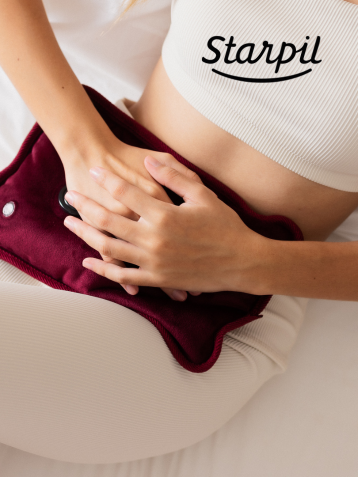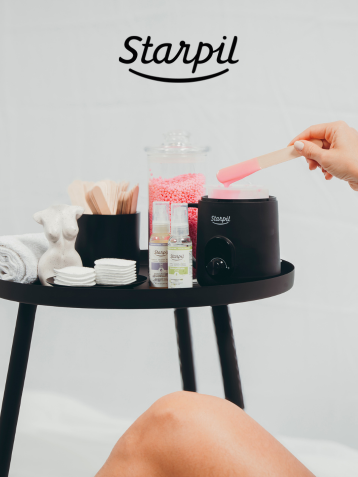How to Prevent Pimples After Waxing

Waxing is an excellent method for achieving smooth, hair-free skin, but it can sometimes lead to an unwanted side effect: post-wax pimples. Depending on your skin type or the area you’re waxing, more people can be prone to pimples after waxing than others. This can also be a big consideration if you're new to waxing or prefer to wax at home.
Don't worry—with the right knowledge and techniques, you can minimize the risk of developing pimples after waxing and maintain clear, beautiful skin. In this guide, we'll explore the causes of post-wax pimples and provide effective tips to prevent them.
READ: Can You Shave Between Waxing?

Understanding Post-Wax Pimples
Before we dive into prevention, it's essential to understand why pimples might occur after waxing. Post-wax pimples, also known as folliculitis, happen when hair follicles become inflamed or infected. This can be caused by:
-
Bacteria entering the open pores after waxing
-
Irritation from the waxing process
-
Ingrown hairs
-
Excess oil production clogging the pores
Now that we know the causes, let's look at how to prevent these issues.
READ: When Does Armpit Hair Grow? Hair Growth for Underarm Waxing
Pre-Wax Preparation: Setting the Stage for Clear Skin
Proper preparation is key to preventing post-wax pimples. Follow these steps before your waxing session:
-
Exfoliate gently: 1-2 days before waxing, use a mild scrub to remove dead skin cells. This helps prevent ingrown hairs and allows for a cleaner wax.
-
Cleanse thoroughly: Right before waxing, cleanse the area with a Pre-Wax Gel to remove dirt, oil, and bacteria.
-
Ensure proper hair length: Hair should be about 1/4 inch long for optimal waxing. If it's too short, the wax won't grip effectively; if it's too long, it can cause more irritation.
-
Choose the right wax: Opt for a high-quality wax suitable for your skin type. For sensitive skin, consider Starpil's Starsoft Hard Wax, which is gentle and effective.
READ: Exfoliation After Waxing: When and How to Do It Right
During the Wax: Techniques to Minimize Irritation
Whether you're waxing at home or visiting a professional, these techniques can help reduce the risk of developing pimples:
-
Work in small sections: This allows for more precise hair removal and less skin irritation.
-
Pull the skin taut: Holding the skin taut helps the wax grip the hair more effectively and reduces the risk of bruising or irritation.
-
Remove the wax in the opposite direction of hair growth: This ensures that hair is removed from the root, reducing the chance of ingrown hairs.
-
Avoid re-waxing the same area: Going over the same spot multiple times can irritate the skin and increase the risk of pimples.
-
Use proper temperature: If the wax is too hot, it can damage the skin and increase the likelihood of irritation and pimples. Always test the temperature on a small area first.
READ: Can I Shower After Waxing?
Post-Wax Care: Nurturing Your Skin
The care you provide immediately after waxing and in the following days is crucial for preventing pimples:
-
Apply soothing post-wax products: Use a product specifically designed for post-wax care, like Starpil's Post-Wax Oil and Starpil Post-Wax Lotion, to calm the skin and promote recovery.
-
Avoid touching the waxed area: Your hands carry bacteria that can easily transfer to your freshly waxed, vulnerable skin.
-
Wear loose, breathable clothing: Tight clothing can trap sweat and bacteria, leading to irritation and pimples.
-
Skip the hot shower or bath: Avoid hot water for at least 24 hours after waxing, as it can further irritate the skin.
-
Don't work out immediately: Sweating can introduce bacteria to the open pores. Wait at least 24 hours before engaging in strenuous exercise.
-
Exfoliate gently after 24 hours: Apply Starpil Ingrown Hair Serum Spray 24 hours after waxing to reduce the formation of ingrown hairs.
-
Moisturize regularly: Keep the skin hydrated with a soothing moisturizer to maintain skin health and prevent irritation.
READ: Brazilian vs. Bikini Wax
Long-Term Skin Care for Waxing Enthusiasts
To keep your skin clear and healthy between waxing sessions, incorporate these habits into your routine:
-
Maintain a consistent skincare routine: Cleanse, tone, and moisturize daily to keep your skin balanced and healthy.
-
Exfoliate regularly: Gentle exfoliation 1-2 times a week (except immediately before and after waxing) helps prevent ingrown hairs and keeps pores clear.
-
Stay hydrated: Drinking plenty of water helps flush toxins from your body and keeps your skin healthy from the inside out.
-
Consider using tea tree oil: This natural antibacterial agent can help prevent pimples when applied diluted to the waxed area a few days after your session. Using Calendula pre & post-wax care products can also help prevent pimples and bacteria build-up post-wax.
-
Be patient with your skin: If you do develop a pimple, resist the urge to pop it. This can lead to scarring and further infection. Instead, apply a spot treatment and let it heal naturally.
READ: Your Complete Guide to Roll-On Waxing

Final Thoughts
By following these tips and taking good care of your skin before, during, and after waxing, you can significantly reduce the likelihood of developing post-wax pimples. Remember, everyone's skin is different, so it may take some time to find the perfect routine for you. If you continue to experience persistent issues with post-wax pimples, consider consulting a dermatologist or a professional esthetician for personalized advice.
With the right approach, you can enjoy the benefits of smooth, hair-free skin without the worry of blemishes.







Commentaires